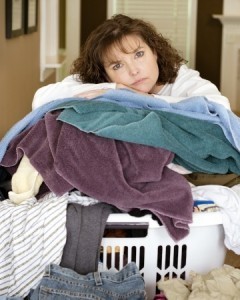The mother load
 In just one week, I’ve seen two smart people use the expression mother load in reference to a large amount of something. I’ve also seen it used in a book by one not-so-smart writer—and overlooked by a sleepy editor.
In just one week, I’ve seen two smart people use the expression mother load in reference to a large amount of something. I’ve also seen it used in a book by one not-so-smart writer—and overlooked by a sleepy editor.
Listen up, folks, it’s mother lode. L-O-D-E. The term, from the mining industry, refers to a major deposit of gold or silver ore. It is also used to describe something valuable or in great abundance, and that’s where people get into trouble. Perhaps it suggests the idea of “mother of all loads,” but that’s neither its origin nor its current meaning.
There is only one way the term mother load makes any sense. Imagine a mythical family in which each member is assigned a separate basket of laundry to wash, dry, and fold. You know the family is mythical because the children are actually doing laundry.
The family responsibilities are:
Father— his own T-shirts, shorts, underwear, socks, and pajamas
Son—his own T-shirts, shorts, underwear, socks, and pajamas
Daughter—her own T-shirts, shorts, underwear, socks, and pajamas
Mother—her own T-shirts, shorts, underwear, socks, and pajamas, anything that requires special handling, jeans, skirts, dresses, blouses, slip covers, curtains, school uniforms, soccer uniforms, ballet tutus, Halloween costumes, choir robes, sheets, workout clothes, yoga clothes, pillowcases, blankets, bath towels, hand towels, kitchen towels, beach towels, tablecloths, napkins, bathmats, dusting cloths, patio cushions, and the dog bed.
In the sense that the mother load is the largest, the term is appropriate here.
So feel free to use it, but only if you’re writing about laundry.



